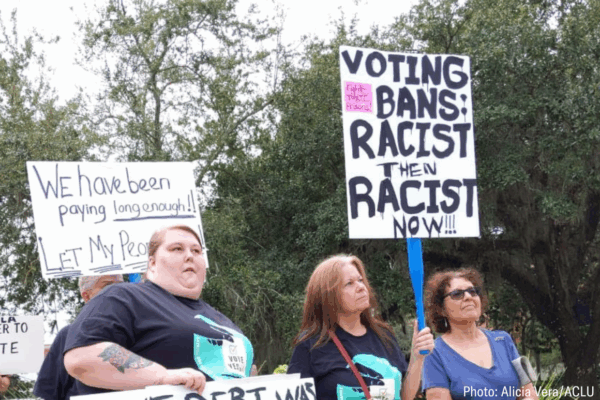Today is the last day of Black History Month, a tradition started by the noted historian Carter G. Woodson in 1915 to celebrate the achievements of Black people, reclaim Black history, and weave Black narratives into the story of America.
Black History Month ends today, but racial injustices persist and remain a pervasive part of Black lives and Black experiences in America. As James Baldwin once said: “History is not the past. It is the present. We carry our history with us. We are our history.” It is important to take a long hard look at the history we carry and examine systems of racial oppression and how they manifest in modern-day Virginia.
Black History Month began a half century after the ratification of the 13th Amendment abolishing slavery in America. Yet, slavery was never truly abolished. Instead, it morphed into many other forms of racial oppressions, from Jim Crow to redlining to the epidemic of mass incarceration we’re facing today. These systems were designed to dehumanize and oppress Black people, relegating them to second-class citizenship — generation after generation.
Voting is a right, not a privilege. You don’t lose your freedom of religion or your right to due process upon incarceration, nor should you lose your right to vote.
One such system that disproportionately impacts Black Virginians is felony disenfranchisement, as Virginia is one of the only three states that still permanently take away people’s right to vote upon a felony conviction unless the governor restores it on an individual basis. This system has disenfranchised hundreds of thousands of Virginians, the majority of whom are Black. The problem is so serious that one in five Black Virginians cannot vote because of felony disenfranchisement, even though Black people make up only about 20% of Virginia’s population.
Taking away people’s right to vote — the currency of democracy — has a racist history. It wasn’t until the Civil War ended and Black men gradually gained the right to vote and political power that felony disenfranchisement became a tool to prevent them from the ballot box. In 1868, Virginia delegates gathered at the Capitol to draft the state’s first constitution since the end of the Civil War. This constitution, which became known as the “Underwood Constitution,” had a charter that guaranteed the vote to every 21-year-old male citizen, regardless of race, and was approved by wide margin in 1870.
Following the drafting of the “Underwood Constitution,” Black representation in Virginia’s General Assembly reached its peak in 1869 with 29 Black lawmakers. For perspective, the Virginia Black Caucus in 2020 has 23 lawmakers. Black men were able to vote and see themselves in positions of power. For the next two decades, lawmakers expanded access to the ballot box, enacted criminal legal reforms and built Black political power from the ground up.
But that progress didn’t last long. In the 1880s and 1890s came political backlash in Virginia and the south. Once a newly elected administration came into power, white supremacists steadily undid the reforms brought about by the previous government and replaced them with Jim Crow laws to oppress Black people. This effort culminated in a slew of criminal laws targeting Black citizens and disenfranchisement laws that denied voting rights to anyone convicted of a felony. These two trends set the stage for the mass disenfranchisement seen in Virginia today.
Voting is a right, not a privilege. You don’t lose your freedom of religion or your right to due process upon incarceration, nor should you lose your right to vote.
This General Assembly session, Virginia lawmakers passed legislation to repeal many antiquated, racist laws that are still in the Virginia Code, such as the poll tax and other segregation laws. Lawmakers also passed laws to expand access to the ballot box, allowing no-excuse absentee voting, same-day voter registration and repealing strict voter photo ID requirements. The Commonwealth, which once embraced enslavement, condoned lynching, and maintained pervasive and crippling racial inequalities through segregation and discrimination, is finally taking baby steps to right the wrongs of history. Justice demands that we uproot the last vestiges of Jim Crow from our law, end the centuries-long oppression of Black people through felony disenfranchisement, and guarantee a right to vote that government can take away from anyone.
Black History Month is drawing to an end, but we must carry the lessons with us and march on toward the more perfect union we aspire to create.


